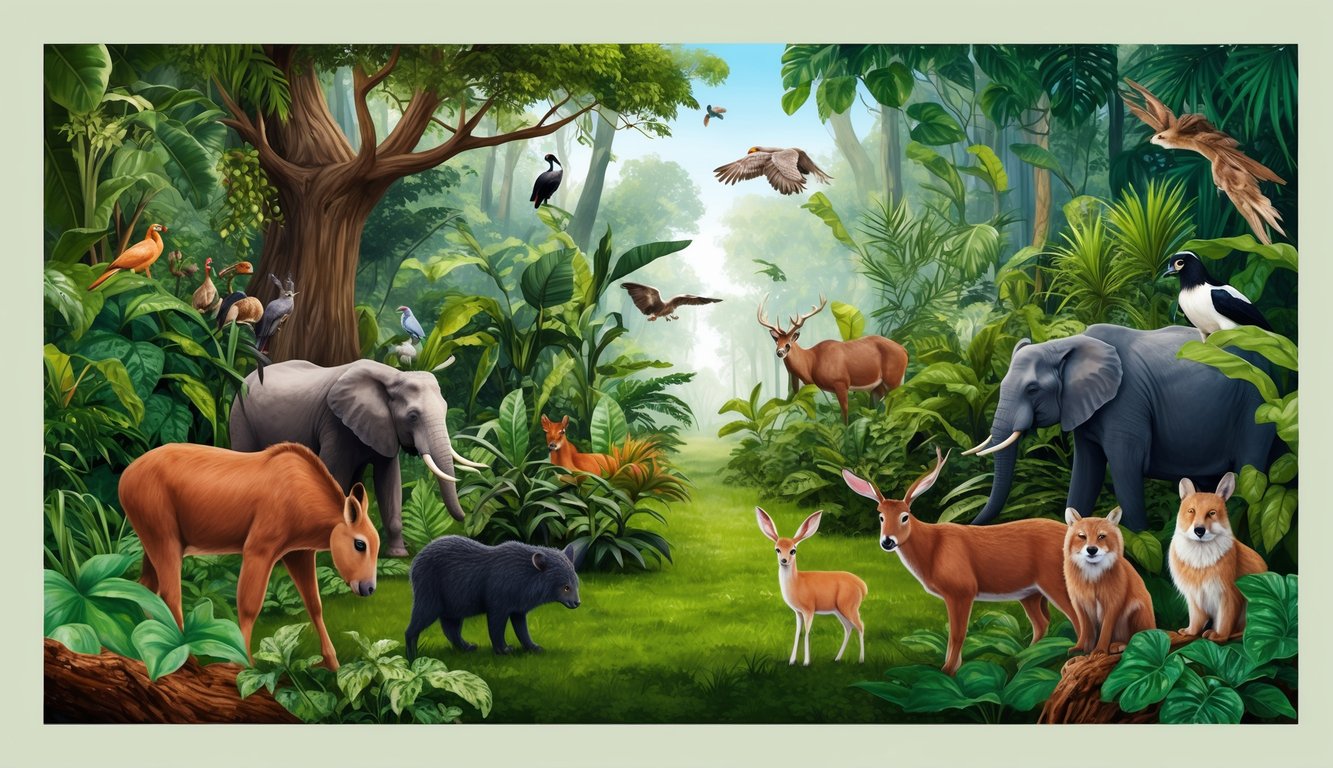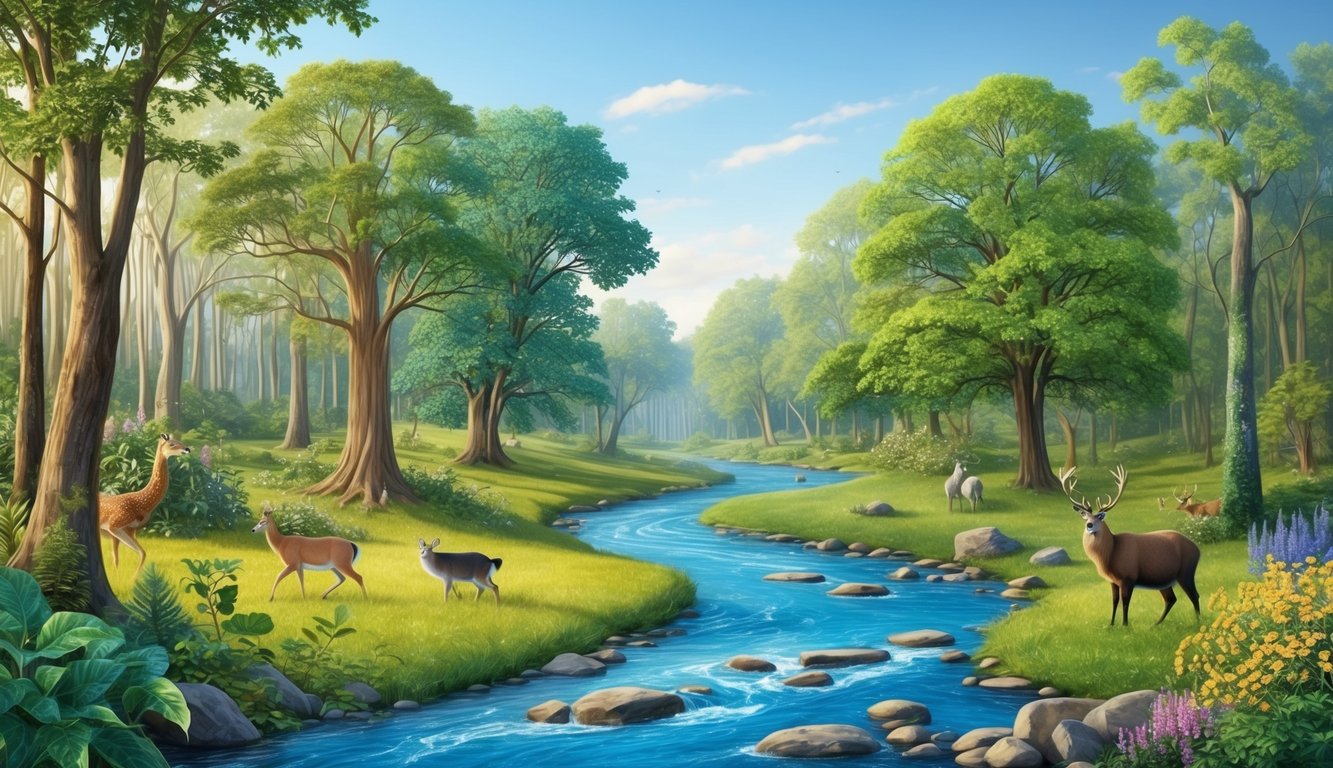Don’t Miss Out On This Unique Astrological Opportunity
Are you tired of spinning your wheels and getting nowhere? Simply put, you’re out of sync: you’re out of alignment with your astral configuration.
But: there’s a kind of map that can help you reclaim your alignment. Think of it as your own personal blueprint to success and happiness: a blueprint that will help you live your most amazing life.
Get started here.
Exploring the connection between the Bible and nature can reveal a profound appreciation for the world around you.
Many verses in the Bible highlight the beauty and majesty of creation, emphasizing how the heavens, earth, and sea reflect divine craftsmanship.
Throughout the scriptures, it becomes clear that nature is not only a backdrop for biblical stories but also a testament to God’s power and creativity.
As you read through these passages, you’ll find that nature serves as a reminder of the knowledge and wisdom embedded in creation.
For example, the intricate details of the earth and the vastness of the heavens invite reflection on the divine design and purpose behind them.
Understanding these biblical perspectives can deepen your relationship with the world and enhance your spiritual insight.
The Bible encourages you to see nature not just as scenery but as a part of creation that resonates with the core truths of your faith.
Explore how these verses resonate with your own experiences and observations of nature.
The Majesty of Creation
When you explore the Bible, you find captivating verses that highlight the beauty and wonder of nature.
These scriptures reveal the incredible work of God as the Creator of the world.
Let’s dive into how Genesis and other parts of the Bible express the glory of creation, feature the majestic heavens, and reveal His presence through nature’s wonders.
Nature in the Book of Genesis
Genesis is a fundamental book that introduces you to the beginning of everything.
Genesis 1 describes how God created the world, shaping it from a formless void into a vibrant and living planet.
He separated the waters and brought forth dry land, plants, and every living creature.
The chapter highlights the immense power and creativity of God, reflecting His vision and mastery in forming the natural world.
Genesis 1:2 offers a picture of the Spirit of God moving over the waters, marking the start of creation’s beauty and complexity.
This foundational text invites you to appreciate and respect the divine craftsmanship evident in every part of nature.
Expressions of God’s Glory
When you watch a sunrise or stand before a mountain, these sights may stir a sense of awe.
The Bible speaks about how nature reflects God’s glory.
Trees, rivers, and mountains are more than just scenery; they are expressions of His power and majesty.
Scriptures encourage you to see God in these wonders.
You understand God’s immense power and beauty through this, deepening your spiritual connection.
Nature serves as a reminder of His presence.
This perspective fosters a sense of gratitude and respect for the environment, reminding you to cherish the world as an elegant expression of God’s divine artistry.
The Beauty of the Heavens
Looking up at the sky at night can be awe-inspiring.
The Bible frequently mentions the heavens to display God’s majesty.
The Psalms often refer to the sky and stars, describing them as the work of God’s hands.
These celestial bodies showcase His incredible power and endless creativity.
The heavens tell of His glory and invite you to be humble, realizing your place in the vast universe He created.
By reflecting on the stars and planets, you are encouraged to appreciate the Creator’s wisdom and marvel at the vastness of His creation.
This reflection can enrich your faith, enhancing your appreciation of the divine nature surrounding you.
The Testament of Nature to God’s Power

Nature beautifully reflects the power and glory of God through its vast and intricate design.
The world around us, with its ever-changing seasons and stunning skies, serves as a constant testament to God’s might and creativity.
The Rhythm of Life and Seasons
As you observe the changing seasons, you witness a rhythm that showcases God’s power in creation.
The cycle of spring, summer, fall, and winter each holds significance.
Spring brings rebirth, while summer offers growth and maturity.
Fall paints the earth in vibrant colors, and winter—though stark—promises renewal.
In Romans 1:20, the apostle Paul emphasizes how God’s invisible qualities and power are evident through creation.
This cycle is consistent and reliable, highlighting an intricate design.
Mountains rise majestically, contrasting with the flat plains, showcasing the diverse landscapes that inspire awe and respect.
The Brilliance of the Skies
Look up at the sky, and you see the brilliance that testifies to God’s glory.
The sun provides light and sustenance during the day.
At night, the moon and stars grace the dark skies, offering guidance and tranquility.
This celestial display speaks to the orderly nature of God’s creation.
The heavens, filled with endless stars, proclaim a sense of wonder and mystery.
Each star, like those mentioned in Biblical texts, reminds you of the vastness and majesty of the universe.
These heavenly bodies show the power of their creator, leaving no doubt of His grandeur.
Flora and Fauna in Scripture

In the Bible, the natural world plays a significant role in teaching lessons about life and God’s creation.
Many passages highlight how animals and plants are woven into the human experience, reflecting divine care and purpose.
Birds, Fish, and the Breath of Life
Scripture often uses birds to symbolize freedom and divine protection.
The sparrow appears as a humble bird cared for by God, reminding you that you are valued.
In Matthew 6:26, Jesus talks about how birds do not worry about food, yet God provides for them.
Fish hold importance too, especially in stories of Jesus multiplying fish to feed crowds.
Fish also symbolize the early Christian community and the followers of Christ.
Genesis explains how God filled the seas with fish and the skies with birds, showing divine power and love for all living creatures.
Fish are also central to the story of Jonah and the whale, where Jonah is swallowed by a great fish and later emerges, symbolizing redemption and faith.
This tale emphasizes God’s mercy and the importance of obedience.
Throughout the Bible, fish serve as powerful symbols of sustenance, faith, and divine intervention.
Trees, Fields, and Their Inhabitants
Trees are important symbols, often representing wisdom, strength, and life.
The olive tree is mentioned frequently, symbolizing peace and God’s blessings.
The parable of the mustard seed describes how a small seed grows into a large tree that provides shelter for birds, illustrating how faith can flourish.
Fields and grasslands appear as places of abundance and work.
Psalms speak of fields praising God, while fields in parables often symbolize the world, where seeds of faith are sown.
The Bible encourages you to observe nature and learn from it about growth and divine care.
God’s Care and Provision Through Nature

In the Bible, nature reveals God’s love and care for all creation.
Through the abundance of the earth and the beauty of the natural world, you can see God’s hand in providing for your needs and bringing you peace.
The Sustenance from Earth and Water
The Lord provides for you through the earth and water.
As you read Psalm 104, see how it describes the earth’s bounty and God’s provision.
The land produces food for cattle and crops for people, showing God’s care.
Rain nurtures plants, ensuring there is enough to eat and drink.
This natural cycle demonstrates how you are sustained through divine provision.
Remember the miracle of water from rocks, nourishing the Israelites in the desert.
God’s provision is not limited to one place or time.
Instead, it illustrates how God continually ensures your needs are met through nature.
The Joy and Rest Found in Creation
Nature is not only about sustenance but also about joy and rest.
God has created a world where you can find peace among the trees, lakes, and mountains.
Walk in a forest or sit by a stream, and feel a sense of calm.
This rest is a gift from God, offering a refuge from daily stresses.
Psalm 104 also highlights the joy found in God’s creation.
The beauty of the natural world evokes praise and gratitude.
By finding rest and joy in nature, you connect more deeply with God’s care and love for you.
The Human Responsibility to Nature

In the Bible, there are many insights about how humans should relate to and care for the natural world.
You’ll find teachings on stewardship, worship, and learning from nature, which offer clear guidance on this responsibility.
Stewardship and Call to Worship
You are called to be a steward of the Earth, which means you look after and take care of all creation.
According to biblical teachings, stewardship is not just about managing resources but also involves worship and respect for God’s creation.
In Genesis, humans are tasked with the responsibility to “fill the earth and subdue it” (Genesis 1:28), suggesting a need for thoughtful management.
Worship is intricately connected to this idea of stewardship.
When you respect and care for nature, you are participating in a form of worship.
Creation itself often gives glory to God, showing His power and beauty.
Texts like the Psalms frequently mention how the heavens and the earth declare God’s glory.
By caring for the earth, you become a witness to this divine glory, partaking in acts of praise and worship.
Lessons from the Creatures and the Land
Nature offers valuable lessons if you pay attention.
In Job 12:7-10, for example, you are encouraged to learn from the animals and plants.
The passage suggests that each creature and the land itself hold wisdom about God’s love and creativity.
Listen to the earth for insights on justice, balance, and respect.
These lessons show how every part of creation is interconnected.
Creatures and land serve as witnesses, teaching humility and reminding you of your place in the world.
Observing the natural world can ignite hope and inspire actions aligned with God’s commandments.
The responsibility you carry involves learning and applying these lessons to live harmoniously with nature.



